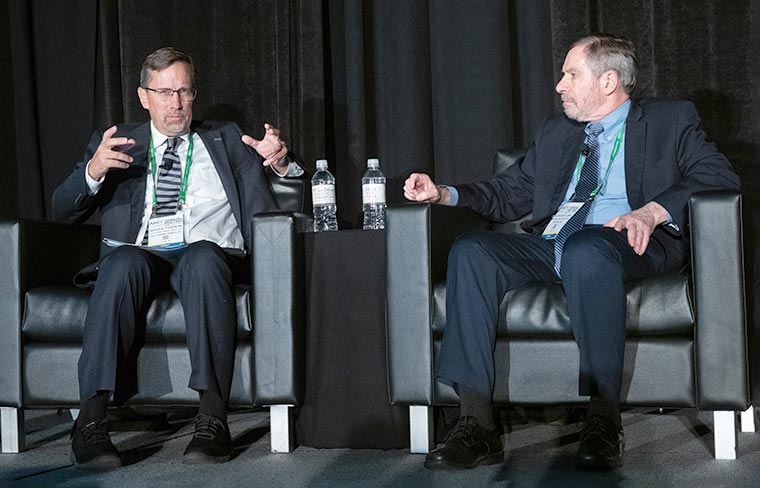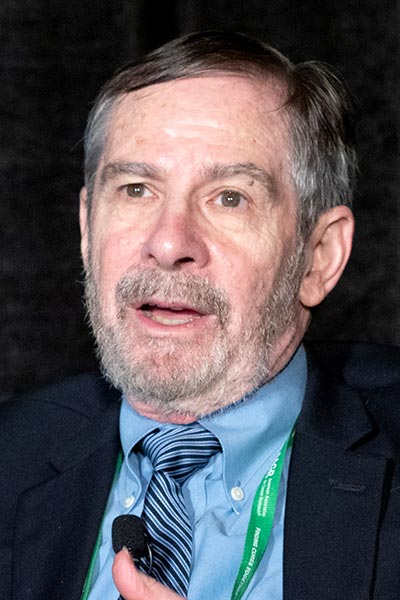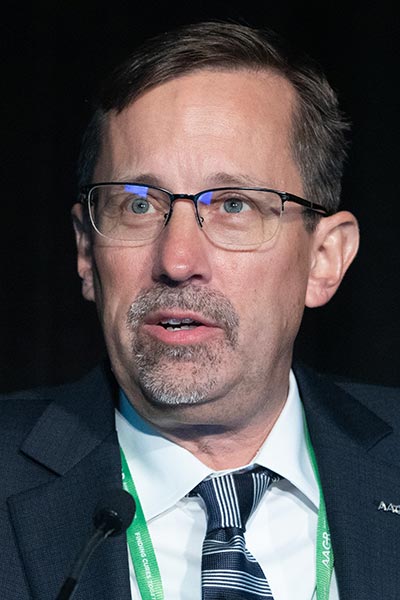Douglas R. Lowy, MD, FAACR, enthusiastically steps in as NCI acting director

On Monday, April 11, National Cancer Institute (NCI) Principal Deputy Director Douglas R. Lowy, MD, FAACR, told Annual Meeting attendees that his plan to step in as acting director of the NCI with “full commitment and enthusiasm” is only tempered by his wish that outgoing NCI Director Norman E. Sharpless, MD, FAACR, was staying.

Lowy was named acting director last week after Sharpless announced he was stepping down at the end of April following five years as the head of the NCI, which is the largest of the 27 institutes that compose the National Institutes of Health.
Lowy is no stranger to leading the NCI. He has previously served as acting director from April 2015 to October 2017, and again in March 2019.
“This is the third time that I have a once-in-a-lifetime opportunity to be the acting NCI director,” Lowy joked.
“If I have been successful in the past, and if I am successful now, it is largely because of all of you,” Lowy told Annual Meeting attendees, adding that it was “difficult, if not impossible to exaggerate the importance and impact of the AACR and the AACR Annual Meeting on cancer and cancer research.”

Lowy sat down for a ‘fireside chat’ with David A. Tuveson, MD, PhD, FAACR, who was AACR President at the time but has since relinquished the role to new AACR President Lisa M. Coussens, PhD, FAACR. The session, Research Progress, Funding, and Opportunities: A Fireside Chat featuring Douglas R. Lowy, MD, Incoming Acting Director, National Cancer Institute, can be viewed on the virtual platform by registered meeting participants through July 13, 2022.
In his opening remarks, Lowy praised the decline of cancer mortality rates since 2000, and the recent acceleration of this decline to decreases of about 2.5 percent per year.
“There are still an unacceptable number of deaths from cancer, but at least we are going in the right direction,” he said.
Among many exciting research advances, Lowy highlighted recent progress made toward KRAS mutants, a target previously thought to be undruggable. Last year, the U.S. Food & Drug Administration (FDA) approved what Lowy said he expects to be the first of many agents targeted at KRAS.
“In order to do this research and continue to make the progress we have been making—and hopefully accelerate it—we need money,” Lowy acknowledged before describing budget constraints at the NCI over the last few years.
“We are all aware of the very low rate of paylines that we have had for the last few years, which is largely attributable to a major increase in the number of applicants and applications to NCI compared to the rest of the NIH,” Lowy said.
This year, the NCI announced that R01 grants for established and new investigators will be funded at the 11th percentile, consistent with the last few years. R01 grants will have a payline at the 16th percentile, while noncompeting grants will be funded at 98 percent of committed levels.
Lowy acknowledged that the NCI’s current funding levels and budget are insufficient, especially as the institute continues to work toward addressing health disparities, diversity, equity, and inclusion.
Lowy took a few minutes to review progress made as a result of the initial Cancer Moonshot. During its first three years, from 2017 to 2020, the Moonshot initiative has supported more than 1,200 publications, 22 clinical trials, and 14 patent applications. Much of the Moonshot funding has gone to intramural research, he said.
“The next fiscal year, 2023, is the last year that you will have funding for the Moonshot—then Moonshot funding drops down to $0,” Lowy said. “That’s why we are extraordinarily fortunate that the Biden administration wants to think very seriously and systematically about what to do with the second phase of the Moonshot. Needless to say, the NCI will play a very important role.”
After his presentation, Lowy sat with Tuveson for a one-on-one conversation. Tuveson took the opportunity to ask Lowy some interesting and pressing questions, the first of which was about Lowy’s priorities as acting director.
“DEI [diversity, equity, inclusion] has to be front and center and I think we have to do it two ways,” Lowy said. “One is to talk the talk, but the other is to walk the walk. The NCI needs to be thinking about how to wisely invest more resources in this area.”
Tuveson also asked Lowy if he thought it would be possible to get to 15 percentile funding of the NCI’s RPG pool.
“It should be possible,” Lowy responded. “We have tremendous bipartisan support in the House and the Senate, but it also costs a lot of money to get up to that 15th percentile. You are key in making that happen.”
Tuveson encouraged members of the cancer research community to actively advocate for cancer research funding. Lowy recommended a three-pronged approach in these efforts.
“First, [tell] a story. Tell them something that can happen today that wouldn’t have been possible 20 years ago,” Lowy said. “Second, [discuss] opportunities. The program is not uniform. In pancreatic and ovarian cancer there has not been much, but there are opportunities. Third, is that it can’t get done without money.”
Tuveson and Lowy also discussed the reinvigorated Cancer Moonshot initiative. Tuveson asked how members of the AACR and the research community could help achieve the goal of reducing cancer mortality by 50 percent in the next 25 years.
Lowy recommended several things, including wider dissemination of effective standard-of-care therapies that already exist, continued work on smoking cessation, and ongoing research into what he called high-value targets that can change the available standard of care.
Tuveson ended the discussion by reminding attendees, “If he succeeds, we succeed.”
Register Today for the AACR Annual Meeting 2025
Don’t miss the most important cancer meeting of the year, April 25-30 in Chicago, Illinois. In-person and virtual registration packages include full access to live sessions, Q&A, networking, CME/MOC credits, and more.

